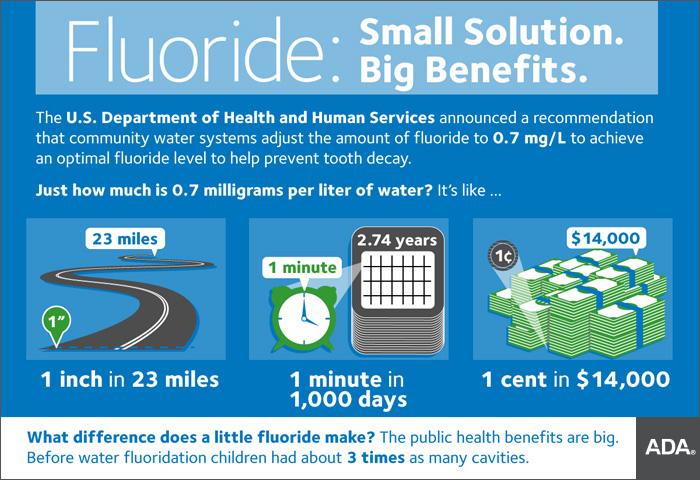Water Fluoridation
Show Me About Missouri’s Community Water Fluoridation – General Public
Show Me About Missouri’s Public Water systems and Fluoride – Water Operators
Recent News
- Consequences of Banning Fluoride
- State-Level Costs of Removing Fluoride from Community Water Systems
- Exposure to Fluoride in Water: How it’s Measured Really Matters
- Association between low fluoride exposure and children's intelligence: a meta-analysis relevant to community water fluoridation
- ADA - Fluoride
Community water fluoridation helps prevent tooth decay by adjusting the fluoride in the water supply to an optimal level. Many drinking water supplies contain some fluoride naturally, however, to prevent tooth decay, it is important to supplement and maintain an adequate level of fluoride to achieve this goal.
Facts About Water Fluoridation
- Fluoridation is safe.
- Fluoridation is the least expensive and most effective way to reduce tooth decay.
- People drinking fluoridated water have 20 to 40 percent less tooth decay.
- Fluoride Fact Sheet for Consumers
- How Fluoridation Works English | Spanish
Approximately 100 communities in Missouri are currently supplementing the natural fluoride level in the water system to the optimum for dental decay prevention.

Graphic used with permission from ADA.
What is fluorosis?
Dental fluorosis is a condition that causes changes in the appearance of tooth enamel. It may result when children regularly consume fluoride during the teeth-forming years, age 8 and younger. Most dental fluorosis in the U.S. is very mild to mild, appearing as white spots on the tooth surface that may be barely noticeable and do not affect dental function. Moderate and severe forms of dental fluorosis, which are far less common, cause more extensive enamel changes. In the rare, severe form, pits may form in the teeth. The severe form hardly ever occurs in communities where the level of fluoride in water is less than 2 milligrams per liter.
Fluorosis is not a disease. The effect of fluorosis, in most cases, can only be determined by a dentist during an examination. Fluorosis in the United States will not effect tooth function and may make teeth more resistant to tooth decay.
My Water’s Fluoride
- Visit Missouri's "My Water’s Fluoride" page to find out whether your local water system optimally fluoridates its water. For more specific information, contact your local water district.
- The Missouri Department of Natural Resources maintains a website containing Consumer Confidence Reports on each community water supply in Missouri.
Education
- American Academy of Pediatrics (AAP) I Like My Teeth
- American Dental Association (ADA) Optimal Fluoride Level in Drinking Water
- ADA Mouth Healthy Fluoridation
- American Fluoridation Society
- Center for Disease Control and Prevention (CDC), Community Water Fluoridation
- Community water fluoridation and the integrity of equitable public health infrastructure
- Fluoride Exposed
- Fluoride in Our Water: Facts You Need to Make a Healthy Choice
- Fluoride Missouri
- Fluoride Science
- Missouri Coalition for Oral Health - Resources
- The Story of Fluoridation
Fluoride Notification Statute Information
Missouri Revised Statute 640.136 was signed by the Governor in June of 2016. This statute requires that any public water system or district must notify the Missouri Department of Natural Resources (DNR), Missouri Department of Health and Senior Services (DHSS), and its customers of its intentions to make modifications to fluoridation of its water supply.
- To review the state law: Missouri Revised Statute 640.136.
- A change in practices includes any addition or discontinuation of fluoridation.
- The notification must take place at least 90 days prior to any vote or meeting where a change in fluoridation practices is decided.
- Notification of customers may be accomplished through any combination of the following: radio, television, newspaper regular mail, or electronic means.
- The Notification of Fluoride Modification Form must be submitted to both DNR and DHSS.
Missouri's Fluoridation Plan
Oral health is an important part of good health. Cavities are the most common long-lasting disease in children and adults in Missouri. Cavities can be prevented.
Poor oral health affects the ability to eat and speak. Poor oral health is associated with diabetes, heart disease, stroke, osteoporosis and pre-term births. These health issues have a negative impact on other long-lasting health conditions. Poor oral health impacts a person’s self-esteem and mental health. Poor oral health can make it harder to get a job. Missouri communities have health differences based on race, poverty level, age, geography, and access to care. These differences put communities at a higher risk for cavities.
Missouri’s Fluoridation Plan serves two goals. The first is education about the benefits of community water fluoridation (CWF). The second is a guideline to promote ideal fluoridation in Missouri. CWF is a public health program that will improve oral health and overall health for all Missourians.
The Missouri Fluoridation Plan covers topics that include the laws and regulations on CWF, education and training, Missouri CWF data and more.
To receive the Missouri Fluoridation Plan, request it by name when emailing oralhealth@health.mo.gov.
